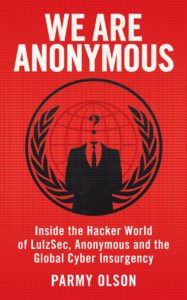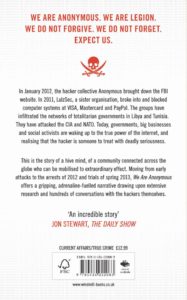We are Anonymous. We are legion. We do not forgive. We do not forget. Expect us.

As I write, Anonymous ‘hacktivists’ are carrying out cyberattacks on Russia in response to their invasion of Ukraine in February 2022.[i] Anonymous is an online ‘legion’ of hackers that carry out cyber-attacks to advance the social and political change they want to see. Anyone can become part of Anonymous because it is not an organisation but rather a decentralised and non-hierarchical movement. In 2008, Anonymous became well-known for attacking the Church of Scientology that allegedly had censored websites online. The hacking project launched online has also manifested in real-life protests, where the protesters often wear the well-known ‘Guy Fawkes’ mask. Anonymous’ stated goals are to defend freedom and increase social justice online. To realise this, they hack many targets such as governments, big companies like PayPal and MasterCard, organisations like the Ku Klux Klan and ISIS terrorist organisations. What I find fascinating about Anonymous in relation to peace is that they ‘commit crimes’ in the name of justice.


My interest in how peace is visualised in cyberspace
led me to reading the intriguing book We Are Anonymous by Parmy Olson (2013). Olson offers the reader an insight into the hacker world, where the distinctions between collective and individual, crime
and activism, and war and peace are unclear. It is evident that in the hackers’ pursuit for justice, they disrupt the livelihood of individuals, not just the operations of businesses and governments. Sometimes, their hacking is on the ‘peaceful’ side. But sometimes, it is not. Their tactics can be combative, even aggressive. Olson delves into the group dynamics that play out in Anonymous. Veiled behind computer coding and crypto language, a collective of individuals operates and steers the norms of the attacks that are carried out. Peace is not explicitly addressed by Olson or stated as a goal by Anonymous. Yet, in terms of individuals asserting agency online, it is apparent that hacktivism is used as a means to fight for social justice (often seen as a pre-condition of peace[ii]) and to also reduce the effectiveness of aggressive powers who are waging war on others. To an extent, then, it could be viewed as a tool for conflict resolution or even peacebuilding, despite its disruptive and aggressive nature. Hacktivism gets us thinking about the relationship between peace, resistance, rebellion and revolution. I wanted to include it in our museum as a provocation, to stretch traditional habits of visualising peace.
Anonymous in action:
For Elon Musk:
// people are beginning to see you as nothing more than another narcissistic rich dude who is desperate for attention.
// you may think you are the smartest person in the room but now you have met your match.For Vladimir Putin:
// Mr. Putin. The ongoing invasion of Ukraine has shown that your regime has no respect for human rights.
// Members of Anonymous have declared cyberwar against your agressive regime.
What do you think?
- Do you think that hacktivism can be a tool for peacebuilding? Or do you think of it more as a weapon for waging war?
- How might we reconcile the harm and disruption that hacktivism causes with the idea that it can be used as a way of working towards social justice and even peace?
- To what extent do you believe that you have any agency online to work towards social justice and peace? What ends would you go to for this? What cyber methods do you prefer?
If you enjoyed this item in our museum…
You might also enjoy ‘Pride: peace in social justice and the power of solidarity‘, ‘Colombia: the long road to Peace‘ and items with the tag ‘Social Media‘.
Otilia Meden, May 2022
[i] https://www.cnbc.com/2022/03/16/what-has-anonymous-done-to-russia-here-are-the-results-.html.
[ii] For more on the interconnection between social justice and peace, see XXX (Lia’s pieces).